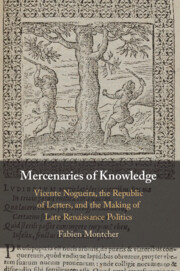Refine search
Actions for selected content:
8 results
3 - Austria and Bohemia
-
-
- Book:
- Reformations Compared
- Published online:
- 14 March 2024
- Print publication:
- 21 March 2024, pp 61-79
-
- Chapter
- Export citation
5 - Mercenary Diplomacy
- from Part III - Bibliopolitics and Conflict Management
-
- Book:
- Mercenaries of Knowledge
- Published online:
- 14 September 2023
- Print publication:
- 28 September 2023, pp 177-218
-
- Chapter
- Export citation

Mercenaries of Knowledge
- Vicente Nogueira, the Republic of Letters, and the Making of Late Renaissance Politics
-
- Published online:
- 14 September 2023
- Print publication:
- 28 September 2023
Chapter 3 - Virgilio Malvezzi and the Mosaics of Morality and Necessity
-
- Book:
- The Power of Necessity
- Published online:
- 22 December 2022
- Print publication:
- 05 January 2023, pp 127-179
-
- Chapter
- Export citation
Part XXI - Audiences
-
-
- Book:
- The Cambridge Guide to the Worlds of Shakespeare
- Published online:
- 17 August 2019
- Print publication:
- 21 January 2016, pp 1483-1544
-
- Chapter
- Export citation
Part IX - England, 1560–1650
-
-
- Book:
- The Cambridge Guide to the Worlds of Shakespeare
- Published online:
- 17 August 2019
- Print publication:
- 21 January 2016, pp 607-680
-
- Chapter
- Export citation
209 - Shakespearean Players in Early Modern Europe
- from Part XXI - Audiences
-
-
- Book:
- The Cambridge Guide to the Worlds of Shakespeare
- Published online:
- 17 August 2019
- Print publication:
- 21 January 2016, pp 1527-1533
-
- Chapter
- Export citation
87 - England’s Place in the International Order
- from Part IX - England, 1560–1650
-
-
- Book:
- The Cambridge Guide to the Worlds of Shakespeare
- Published online:
- 17 August 2019
- Print publication:
- 21 January 2016, pp 668-674
-
- Chapter
- Export citation
